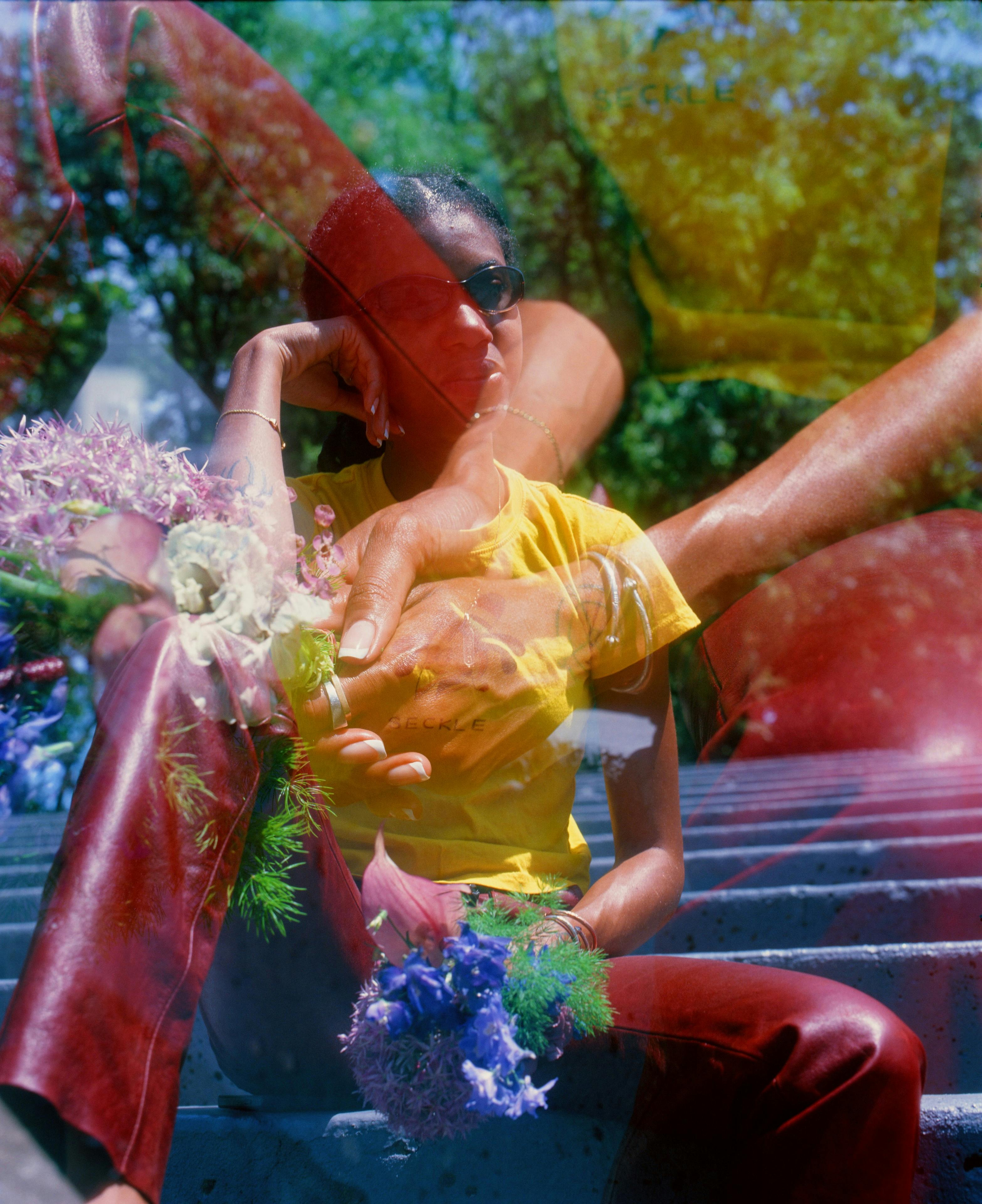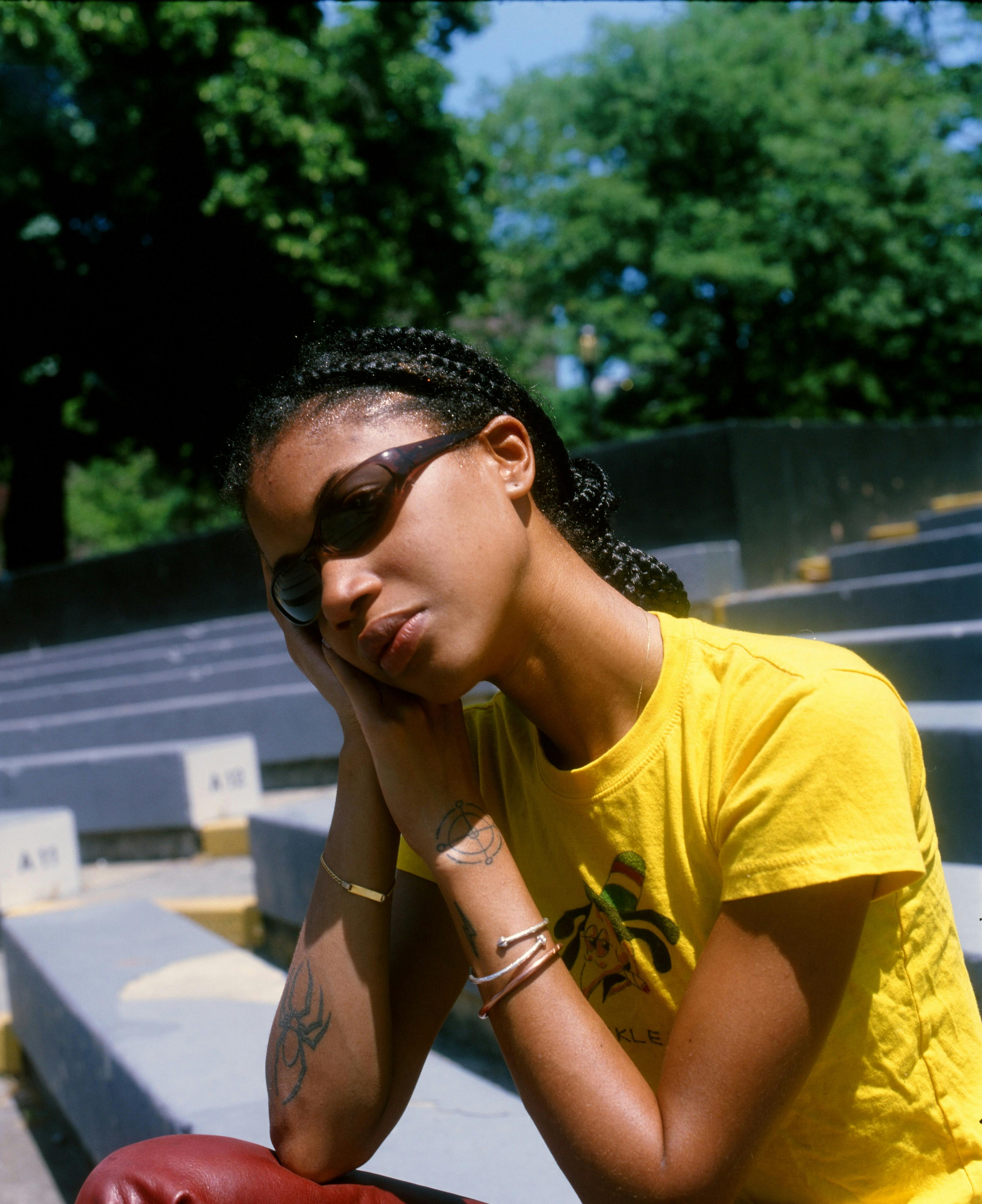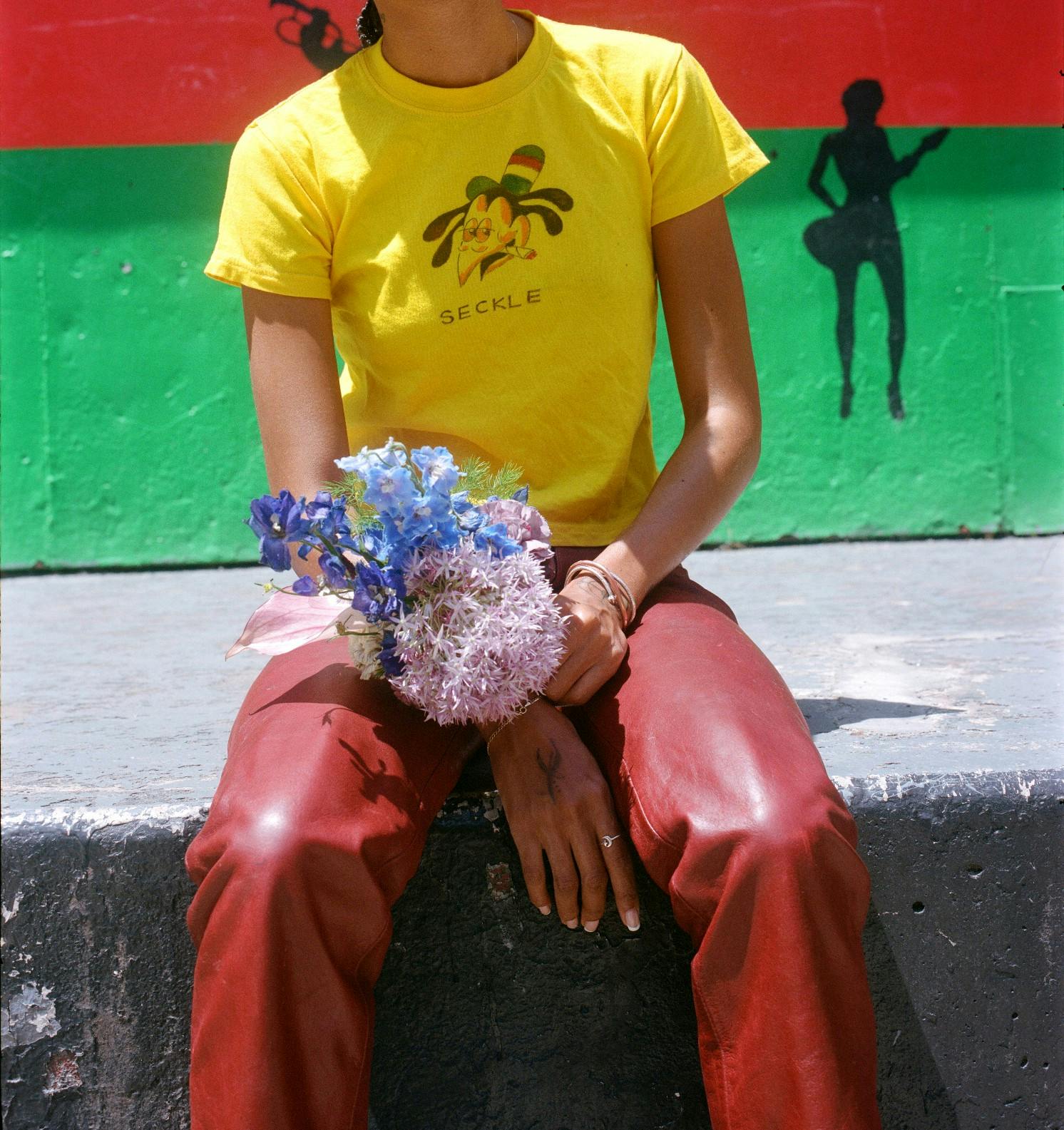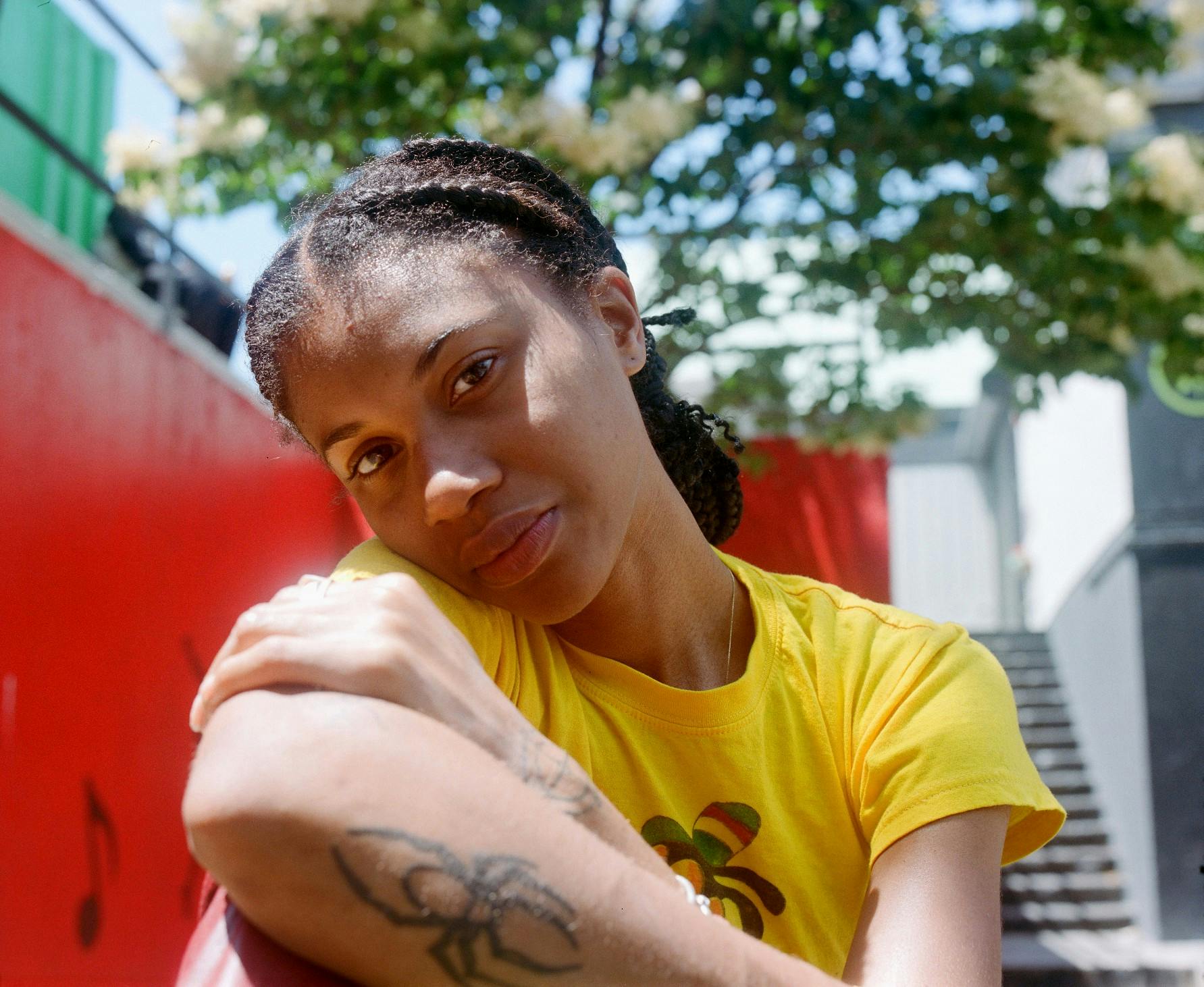
Out of Seam:
A Studio Visit
with Tajah Ellis
Words and Images by Kristin S. Rowe
Tajah Ellis works with her hands – in the most literal sense of the word. She allows her background as an urban farmer to inform her practice by using natural pigments sourced from plants in her home country of Belize. A gifted bouquet that would have otherwise ended up in the trash becomes a part of her work. Ellis sees the beauty in the overlooked and discarded to create pieces that will last lifetimes with a story of intentionality to match.
I met up with Tajah during a period where she was freshly transitioning back into city-living, her studio located in the same home she grew up in. We oscillated between there and Herbert Von King Park, another formative location to her upbringing. We spoke on the interconnectedness of nature, history, and art, the importance of standing in your own power, especially in a world where Black women artists are quick to be compartmentalized and why labeling herself as a designer would be a disservice to the roots she’s been sewing to build her world, Out of Seam.


Kristin: What would you say are some integral points in your work? And I mean that, environmentally, materialistically, and even emotionally because I know you work with a lot of plants and raw materials. How do all of those things intersect and show up in your practice?
Tajah: I guess if I had to sum it up, I would say experimentation, due process, and exploration. I see curiosity as a pivotal point for uncovery, and being able to lean into that just by saying — okay, I'm going to define rules in my own way. So yeah, experimentation is a huge part of pretty much everything. I'm not so concerned about the end result, I'm more interested in what it took to get there - and to create this unique configuration of whatever it ends up being.
K: That's beautiful. There's something special about just the act of doing rather than doing for an end result. Letting the practice or the medium take you on a journey – building and being informed through that. How would you say your practice has shifted over time, and what is something you value in practice in this current stage of your life?
T: Man, I'm in such a redefinition, re-imagination mode right now. I feel like there's definitely been a huge shift in my timeline. Where it's like before Christ and after Christ, I'm in my after-Christ mode, so was everything was BC and now I'm in AD.
So that's how it feels, right now is after death, and I'm in a new rebirth. But time is also mapped out in such a different way, whereas before, I had a lot of momentum going. Like I said, it was all about just being in the moment. I got so much out of that, and I gave so much out of that. But now I have a lot more patience and understanding about my space within my craft. Also, existing the way that I do within my field where it's so fresh and so new, natural dyes and this new perspective on it is a relatively new phenomenon, at least in a mainstream way where people understand it and respect it within whatever fields and sphere. So it's important to understand how that fits into the world. But for me, it's deeply visceral and deeply experiential. And it allows me to meet myself constantly.
K: I like that.

T: I'm doing a lot of community-incentivized workshops right now, and those feel very true. It just feels great. You and I were talking a bit before about how I feel doing what I'm doing, and I feel like that's the main part of its romance. That's how I would definitely encapsulate all the work that I'm doing where I feel my most joyous, my most purposeful, my most free, working with flowers and colors. And it gives me a different context and shape to be able to share that with others, but also to be able to see what's possible. And there are so many different spheres and realms to go into with that. It's a truly beautiful space to be, to know that it is serving, you are of service, and it just is this ultimate reverberating feeling that I love being able to provide and be a vessel for childlike wonder and curiosity.
K. Heavy on the childlike wonder.
T: Yeah, just joy and happiness and laughing because you want to, and just having this lightness of spirit. And I do believe when one is just flowing in the realms of their life, it's the little things, it really is the little things, the little moments in between, and those bigger acclamations, they just kind of prove it. But really, life happens in between.
K: God is in the details.
T: God is in the details. Exactly.
K: Being from Bedstuy, even though ya know we're currently in Herbert Von King Park, the ambiance is flowing, and you're from here, how does that influence your practice?
T: Damn. Well, it's obviously not the Brooklyn I was born into. You and I were just discussing this Brooklyn that we were born in where there's this idea that people either think of New York as now in this post-era or New York then as the eighties and the crack epidemic. And we existed in this generation in between where we were internet kids. We were inside kids, we were kids of programs and after school. And having parents who really were (for those of us who had them) were active in our lives in a particular way. Especially being Caribbean, especially being first generation, especially being the first girl in the family. There were a lot of expectations that shaped me for sure.
So I see those opportunities as having led me into certain realms, but without real direction, to be honest with you, because there was no example. So I kind of became this interesting mix of being into punk, growing up in Nirvana and grunge, and really into my Soundgarden and all the things that came with My Chemical Romance and having really specific friends for that in middle school. They were Pakistani and Dominican, from Sheepshead Bay, and we were just these alt girls, people of color. When I went to high school, I got more into actually embracing being from the hood, and what that felt like, and what that lived like, and leaned more into that in a traditional New York context. People might assume of us Diplomats and Jay-Z and all of that, but I was going through these different iterations where I was embracing my roots and culture, growing up in a home where it was kind of an amalgamation of all this stuff, it's like half Aaliyah, half Bob Marley, or listening to Rolling Stones. So it's just the impact of knowing that New York was never one identity for me, and I was never really comfortable fitting into just one…

K: Like a secular box.
T: It was a box. And even now, a lot of that's still repeated. Everyone thinks I'm going to say like, “yo, my nigga, what's up?” every time I see them. I'm not a cartoon, so I'm like, sometimes, yeah. But a lot of times, no. And I think being from New York has just really allowed a lot of fusion to happen within just this acceptance of my multiple identities.
T: But I also realize some parts of that is a privilege in and of itself having been first gen because there's a lot of people who are from here, and that's just it. Period.
T: So I think that my exploration has been very much because of the context in which I was born, and I embrace a lot of that where I understand the other perspective as well. Where it's like, yo, this is just literally who I am. And it ends there, and there's a certain freedom in that as well. That's a deeper history, it's just different. So I think also realizing it's just personal and to just own the things that make it true for you in a personal way. But it took me a while to come into that.
K: Blessed are the first Caribbean daughters.
T: Literally. Literally.
K: The Warriors, for real.
T: And I feel like even that's understated in some ways. Even when we were talking, our last convo growing up in NYCHA and in public housing, I came back home and the environment surrounding New York has shifted completely. So all these new restaurants, people who are moving here enjoy those amenities because they understand that. But if you exist on a block or two and you've never left, you're not going to see that being for you. You don't feel welcome. It doesn't appeal in the same way. And so it becomes these very specific spaces that you still end up getting boxed into or still end up having to go to because it just speaks your language, where it's like, if you embrace a world and see a world beyond that, you can kind of dibble and dabble into different spaces. So I understand that aspect of it as well, where I see that. I just see that every day when I come home.
K: Again, it's all about the nuance and how it's approached. Last question, if you have one, what is your studio ritual? And I know we have been speaking about just the redefinition of "studio," especially for you right now in this space of just being on fertile ground and just being in this massive rebirth and regrowth into a new trajectory of your practice. So have your rituals changed? Have you adapted new ones? reconnected with old ones? What does that look like for you?
T: Well, for a while, my dyeing was my ritual. It was my routine. It was the place where I would just wake up and have my tea and then be in my cauldron. And then it was a very hypnotic space for me to either process my thoughts and emotions, or to just get on track for whatever it is I do. And now, after being in a new space and having left it for so long, and being in a new environment, it's definitely something I have to make a conscious effort to do. Now it's becoming me getting more in the swing of things. It feels more organic to do that, but different access to different materials, different resources, and coming with a new set of knowledge and information on what's valuable, and what's necessary.

(interrupted by mother scolding her son in the background)
K: Period
T: (Laughs) And I remember those days. I remember those days. See, this is what I'm saying too, sometimes, this is a slightly off marker. But yeah, I was talking to a homie the other day who got super sensitive about a joke I was making. I was like, damn, my sense of humor, I grew up on shade, honestly. And I had to have tough skin growing up because I would get those things. My mom was not shy about embarrassing me in public at all. So it's like I came up with that sort of thing. And we're in a new state, obviously, where you have to be very conscious of the people around you. And I do think that's important for compassion, empathy, and all of that. But there's something to be said about the grit that comes from being raised that way and the things that I really just brush off my shoulder. So yeah, I think that's going to strengthen his character, for sure.
K: Yeah. He's going to grow up learning how to respect a good read. That's building his tough exterior in the flesh, amazing.
T: In the flesh. Yeah, for real. So yeah, I think my rituals of the dyes have definitely been a processing period. That's why I would stress so much about the process. But I'm also beginning to understand it a little bit differently, it's a lived, embodied idea.
And I think the only way to gain true understanding is to actually go through the experience. And the experiential opportunity to see there's very little difference between the words, even of experiment and experience. Because you're just putting these different configurations together and allowing them to do their thing. And I really feel like, in a huge way, that's what life is. It is synchronicity, and it is divine lineups and all of that, but I feel like that's knowledge, that's not a belief. The belief is more in the random moments, the chances, the entropy. That is a huge reason why things can even get the opportunity to be aligned.
It is like there has to be some other thing happening here and some other thing happening there. And somehow, some way, these forces just aligned the butterfly effect and chaos. And I've been embracing a lot more of that thought process of synergy. But there's no precursor for that. And I feel like there's so much beauty in being amazed or in awe or just in a revelation period because there's so much humility in that. And I think humility just gives you so much more of a reverence for life, situations, and context. And even that idea, I've been in this whole little thing with, just context even. I don't see the dyes as an “I created them” because even the way I've come into it was very much like it was bestowed, and I was imparted this wisdom and this path, I have just leaned into that. Those moments couldn't have existed if I didn't just let it be, if I wasn't just being.

K: It was a very organic happening. It wasn't forced. When the work is being done, I feel like things will always just fall into place. People will always find you, the right people, the right things, the right moments. I believe in kismet, but I also believe in practice and experimentation.
T: Exactly. But that's also living on purpose and being okay with your path. It's been very liberating in a lot of ways and also a great access point, but it's also something that you just end up happening into. So I've been creating a lot more work that's more happenstance, where I still create intentionally. If I want yellow, I'll do a little bit of marigolds or whatever. I'll do pinks if I want pinks. But a lot of it has just been me having coffee in the morning, even allowing myself to do that. I've had diet restrictions for five years, and I'm in a fuck it mode.
K: Period. Life is short.
T: Life is short. Fuck it. I love Oaxacan cheese right now. When I was in Belize, the chicken was just fresh. I was just living. And so I got in this coffee habit. The coffee we have here is so trash.
I brought back some coffee from Mexico, and as I've been drinking that, that's been my morning ritual. So I just pour the grinds onto whatever fabric is there, if it's silk, if it's cotton, if it's muslin, whatever. I just end up pouring it on the fabric and allowing it to sit and absorb and come back after a couple of days.
Absorb what it does. And if I want black tea, I just leave it and let it be. When I told you that I was growing bacteria, a lot of the bacteria would happen because of that. It wasn't intentionally me being in a lab, it was like mold grows from water and being in an enclosed space. So it would just happen on its own. It allowed me to see these different shapes and colors and things that formed organically. Of course, science is the procedure of those random moments to recreate them consistently. So obviously, I have a lot of interest and desire to lean more into that because I think those are just the natural next steps of my curiosity.
K: I really love that. It's something as easy as self-care and small things like just drinking coffee in the morning, but also using that to inform your practice and leaving it, and seeing how that transforms. I love that.
